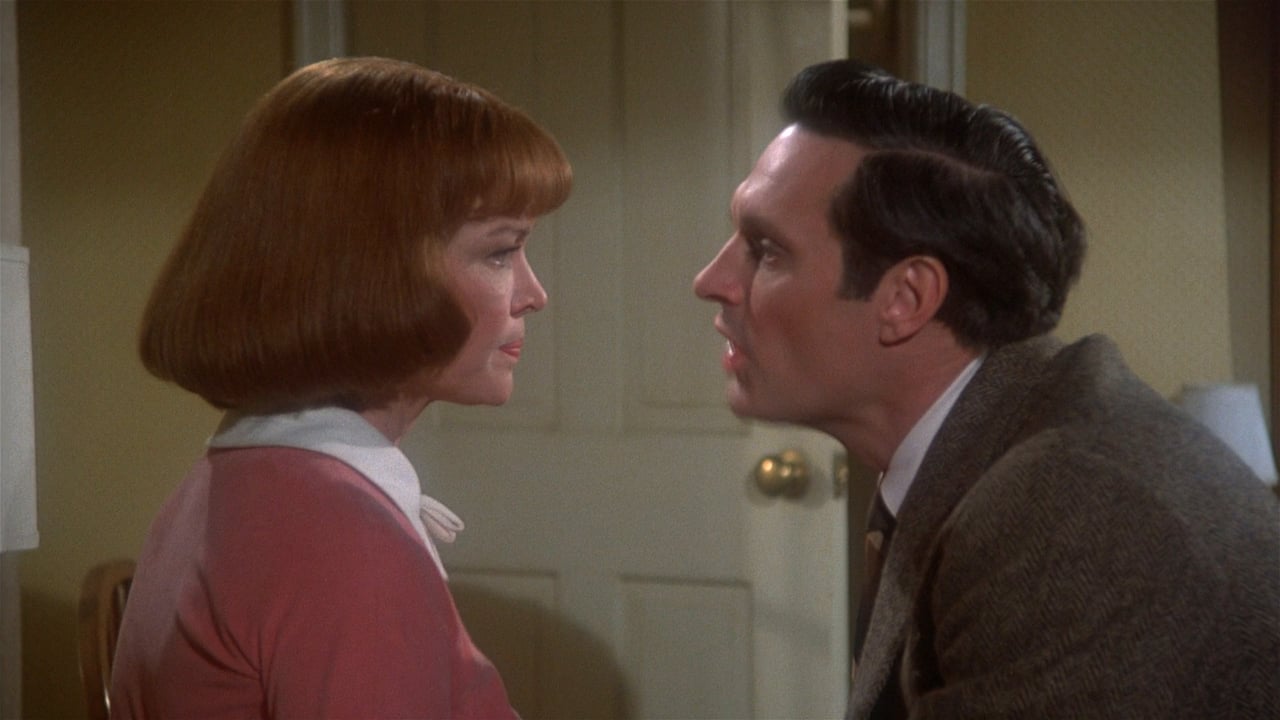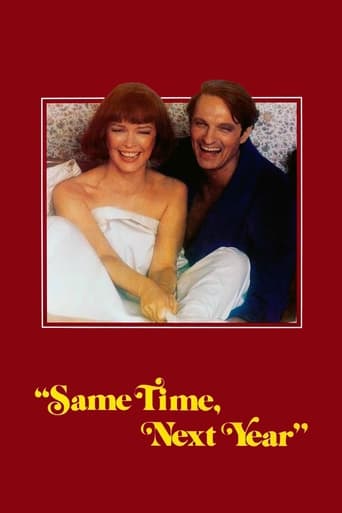

just watch it!
... View MoreJust so...so bad
... View MoreThe biggest problem with this movie is it’s a little better than you think it might be, which somehow makes it worse. As in, it takes itself a bit too seriously, which makes most of the movie feel kind of dull.
... View MoreThe story, direction, characters, and writing/dialogue is akin to taking a tranquilizer shot to the neck, but everything else was so well done.
... View MoreI just saw Same Time Next Year, and I loved it. However one thing that wasn't explained in the movie is Doris's new baby. Did she tell her husband that HE was the father ? If so, don't you think that was kind of deceitful ? Any comments, let me know, thank you, Jim.
... View MoreI have always wanted to see this movie but hadn't had the opportunity until now. It was well worth the wait! I absolutely loved it! Being a long time fan of both Burstyn and Alda, their performances did not disappoint. The subtle comedic jabs of Alda's guilt ridden George added strength to the already deep soul searching hearty dialogue. While Burstyn's ever evolving Doris balanced out the emotional ups and downs of their 25 plus years affair. The in-between pics of the events that shaped the times was a seamless way to move the years along. With such a sensitive subject as this movie examines; it is done in such a way that it leaves the viewer non judgmental but instead routing for their relationship to go the distance. And of course who could go wrong with a soundtrack by Johnny Mathis. SUPERB!
... View MoreBack in the day when you could go to the movies and not have your ears blown out with over-the-top sound and special effects created by some computer (although this was just the year after "Star Wars"), movies with themes usually found today on Lifetime were theatrically released and were classy, not sappy. Broadway plays were transfered to the screen, maybe not entirely faithfully, and the results were usually above average. In the case of this hit mid 1970's two character play (which originated with Ellen Burstyn and Charles Grodin in the leading roles), Burstyn gets to repeat her role, and Alan Alda, then one of the biggest stars on TV and in an occasional movie, took over the male role. They play two married people who meet by chance on the California coast, fall into an affair which neither of them planned, and end up seeing each other once a year because they just can't live without each other, yet they can't get rid of their unseen spouses, either.The film starts in 1951 after the audience is swept away by the beautiful "The Last Time I Felt Like This", sung by Johnny Mathis and Jane Olivor. The song is heard over the film, reflecting the passages in time, the political and social ramifications often taking over the character's lives when they meet up without even having spoken to each other since the last time they bid adieu. At first, Burstyn is a rather insecure young married woman, admittedly a high school dropout and with no more ambitions than continuing to be a housewife and mother. Alda is an accountant, and both are fairly young and innocent as they deal totally differently with the guilt they face of cheating on their partners. But as they think they'll never see each other again, they totally let go of their inner insecurities, and before parting, it is obvious that this will be a regular anniversary get-together for them.Five years, ten years, fifteen years, twenty-one years, and finally twenty seven years pass by, and we see not only the passage of time but how each of their lives have changed. The two get to know each other's spouses and children without ever even meeting them, and as the world changes, you begin to see deep changes within them. At one point, Burstyn is a Berkeley hippie (abliet the oldest one on campus) and Alda is a stuffy accountant seemingly embarrassed by her wardrobe and actions. But there's always more to these characters than what they perceive themselves to be on the surface, and like each visit before (including one where Alda helps a very pregnant Burstyn have her baby!), they find their way back to each other.There are moments of heartbreak and many humorous incidents. Both actors play extremely well off each other, and you can't judge them for their infidelities. In fact, the more you listen to their reasoning, the more you understand that it is their love for each other which has actually been responsible for saving their perspective marriages. There are moments where you will find yourself reaching for a handkerchief and laughing at the same time, and the ending, while potentially bittersweet, is downright hysterical if predictable. But that's O.K. By the time the story is done, you'll feel that you've known these characters for 27 years as well (even if your only 25!) just like each of them felt they knew the others spouse.
... View MoreThis is a film that has stuck with me for many years. If your interested in a film that celebrates the nuances and broad absurdities of human behavior, than this one is for you. The fact that it's based from a play and performed conspicuously in mostly one set, makes us focus on their every word and detail as their lives are revealed to us; along with their own unfolding self-discoveries. It's most surely not a nail-biting super adventure flick such as the Transformers Franchise. For starters, what wonderful performances by Alan Alda and Ellen Burstyn! What is most interesting for me, is that I first saw it when I was 15 yrs old. And by myself. The tittle song that meanders through the film is lovely, and has helped to attach the memory for me all these years as well.The premise is so simple. It's about personal growth, life experiences; and the sharing of those experiences. The fact that Doris and George are both married to other people is a philosophical one, and a personal challenge for the viewer. The truth is, we all age, enter new stages in our lives; and the possibility that an additional love can be apportioned to all of us is put up for consideration. It's in this perspective that George and Doris share intimate chapters of their lives with each other while not able to do so with their respective spouses. A poignant example of this in the film describes George finally revealing to Doris that his son Michael was killed by a sniper during the Vietnam war, but though he loved him, had admittedly been unable to cry about the event until it was Doris's unique understanding and physical touch that finally broke George's angry facade; unleashing a watershed of built-up despair. I think at it's core, the film is able to offer all of us through a unique perspective, the importance of compassion, understanding, communication, and unconditional love. Even through unconventional ways.
... View More